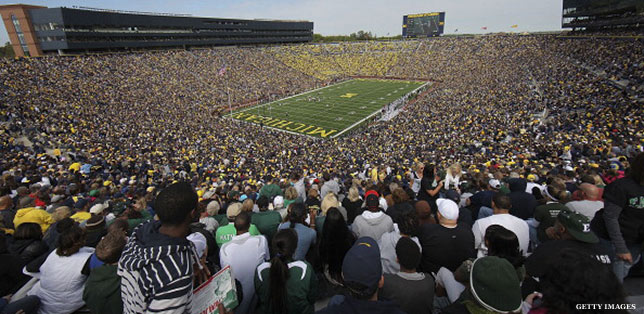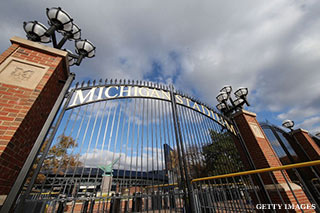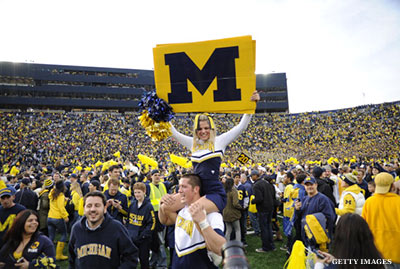
Michigan athletic director Dave Brandon sent a proposal to the university's regents, requesting permission to set off fireworks during two football games this fall.
At first blush, the question of post-game fireworks didn't seem like a very big deal either way. On Michigan fan blogs, reactions were mixed. As for the university's regents, they have bigger things to worry about than fireworks. Even the athletic department's budget -- which has grown by 50 percent the past four years, currently pushing $150 million -- might seem like a lot to us, but that's a rounding error at the university's hospital.
So when the regents voted down the proposal for fireworks for two games this season, it got people's attention.
Michigan's regents rarely split their votes or deny Brandon's wishes. But when the regents looked into the fireworks proposal, they were surprised to find Brandon wanted to set off fireworks not just after both games, but during the second game, after touchdowns -- replacing the century-old tradition of celebrating success with the marching band blasting, "The Victors."
Once bloggers saw that, they exploded like -- well, fireworks. They didn't like the idea any more than the regents did.

More telling were the regents' remarks. Three-term regent Larry Deitch said, "I have religiously attended [Michigan] football games for 50 years. I have not found that experience wanting for lack of fireworks."
Regent Mark Bernstein termed the fireworks a "huge symbolic issue." He explained, "We are not Comerica Park, Disney World, or a circus. I love Michigan football for what it is, and for what it is not. It remains and should be intentionally simple. The fireworks should be on the field, not above it."
The bloggers voiced full-throated agreement, writing things like, "They get it!" "About time!" and "Amen." They might have set a record for quoting regents.

The day after the vote, incoming President Mark Schlissel told a reporter that, being new, he had no opinion on the matter. He made it a point to tell the faithful he appreciates just how important athletics are to the university culture, but he added, "We're an academic institution, so I want to work on the appropriate balance between athletics and academics ... The athletic director does have delegated responsibilities, but he works for me."
On Michigan websites, this sparked another chorus of "Hallelujah."
But what does all this mean? It's easy to read too much into the comments from the regents and President Schlissel. When you boil their quotes down, they represent not a radical departure from the status quo, but a return to it: The protocols, the customs and the traditions Michigan has relied on to become a leader, academically and athletically, for more than a century.
Taken together, however, their comments suggest the people who run the university no longer feel compelled to rubber stamp the athletic director's every request.

The athletic department has bigger things to worry about, too. The department has run ads on its blog, its electronic billboard, on TV and even at a street stand during the Ann Arbor Art Fair, urging fans to buy football tickets -- unheard of.
If those unprecedented efforts didn't tell us how eager they must be to unload tickets by the thousands, the email this week to its golf club members, announcing free tickets for anyone who asks, removed any doubt.
If you went to Michigan, live in Michigan or can find Michigan on a map, don't be surprised if the athletic department offers you free Michigan football tickets. It's a boon for those who've already dropped their tickets – and a bust for those loyalists who already paid full price for theirs.
If Michigan fails to lure 100,000 fans to the Big House this fall for the first time since 1975, the biggest fireworks might not be in the sky or on the field, but in the administrative offices at the university.
-- John U. Bacon is the author, most recently, of Fourth and Long: The Fight for the Soul of College Football, a New York Times bestseller. He gives weekly commentary on Michigan Radio, teaches at the University of Michigan and Northwestern's Medill School of Journalism, and speaks nationwide on leadership and diversity. Learn more at JohnUBacon.com, and follow him on Twitter @johnubacon.




